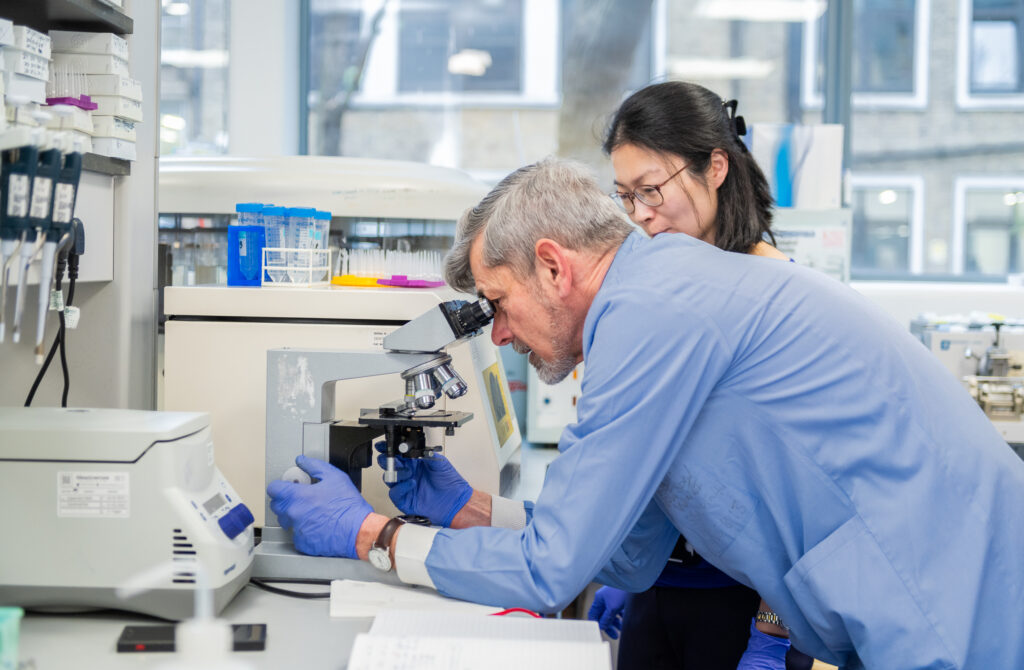Pre-Clinical Research Submission Process
This RFA will be a two-stage process with an initial LOI submissions and review, followed for an invitation only full grant application process.
All LOIs must be submitted through our online portal at The pre-clinical RFA online submission portal. We strongly encourage applicants to view the screens in the online portal system before beginning a LOI. All communications and correspondence will be sent to the identified PI.
All submissions undergo an administrative and scientific review by individuals under a confidentiality agreement.
Applicants should ensure that submitted proposals fit the goals of the funding program, are clearly and logically written, with sufficient details to ensure that reviewers understand all critical aspects of the proposed project methods and plan. Given the length of the LOI (approximately two pages) it is not possible to provide the full scope of the methodological details but sufficient detail to assess strategy should be provided.
For questions about the letter of intent application process and the online system please contact Maria Fonseca, Grants Associate at FoundantHelp@Reeve.org. For questions about the scope of the application, please contact Linda Jones, PT, PhD, Reeve Senior Scientific Director Consultant at LJones@Reeve.org. Please note questions must be sent no later than 48 hours prior to the submission deadline.
The following sections are included in the online LOI:
Administrative Section (Required)
Applicant details, high level information on therapeutic, project team and budget summary. See online for details.
Letter of Intent Summary (Required)
Please label each section in the LOI summary section (10,000-character limit) per headings below and address the requested information under each heading.
Impact: Indicate how a successful outcome of the proposed plan would lead to future development efforts, including ultimate goals and estimated timeline for moving the therapeutic into the next stage of development.
Indication: Describe whether the proposed therapeutic is intended to address neuroprotection, regeneration, and/or plasticity, at what stage of SCI, and in what target SCI population (if known, e.g. severity, level of injury).
Therapeutic: Describe the specific therapeutic being developed, the mode of action, and how the therapeutic was identified. Please identify the strengths and weaknesses of the proposed therapeutic.
Target: Indicate the biological target and hypothesized mechanism and pathway for which you propose to develop a traumatic SCI therapeutic. If available, provide evidence of target engagement.
Stage of Development: Describe the current stage of development of the proposed therapeutic (e.g., high-throughput screening, hit-to-lead, lead optimization, or pre-clinical drug candidate nomination) and discuss relevant data (preclinical and/or clinical) that justifies the progression of the therapeutic to the next development stage (e.g., bioavailability, PK/PD relationships, safety). For drugs, as a guidance, you may refer to the Optional Appendix (Therapeutic Template Profile) Studies to collect gaps in the data can be proposed as part of your application.
Development Plan: Describe and justify the study(ies) you wish to complete to move the proposed therapeutic forward. How do these studies fit into the big picture of developing a therapeutic for persons with SCI?
IP/Competitive Landscape: Describe any intellectual property considerations and/or restrictions that may impact how further development of the proposed therapeutic will proceed (e.g., the existence of competing technologies or legal barriers to commercialization). Please note that if invited to submit a full grant application (FGA), applicants must describe what data can be shared considering IP.
Appendix (Optional)
This section contains a Therapeutic Template Profile which is optional for relevant therapeutics including for small molecules and antibodies (not needed for all types of therapeutics). You may complete any portion of this form for which you have information. Data for this section which has not yet been obtained, could be part of the requested funding.
Review criteria for Letters of Intent include the following:
Impact: Does the proposed therapeutic have the eventual potential to impact people living with SCI? Is it innovation or is it the critical next step in the development process?
Target viability: Is there supportive biological rationale/evidence for target viability and applicability in SCI?
Stage of Development: Does the investigative team have an understanding of the current stage of development and where that fits within a drug/biologic/device development pathway? Are the gaps in knowledge about the therapeutic agent understood? Are next steps elucidated?
Development plan: Are the proposed studies appropriate for development stage and feasible within a two-year award?
Intellectual Property: Are there significant barriers to IP?
Team: Does the proposed team have the knowledge and ability to execute next stages of drug therapeutic development?
You may also be interested in

How your money helps
With your generosity we are able to fund groundbreaking research with the power to transform lives.

Spinal Research and Reeve Foundation announce joint international research call.

Ways to donate
Your generous donation today will make a real difference, helping us drive forward vital research.